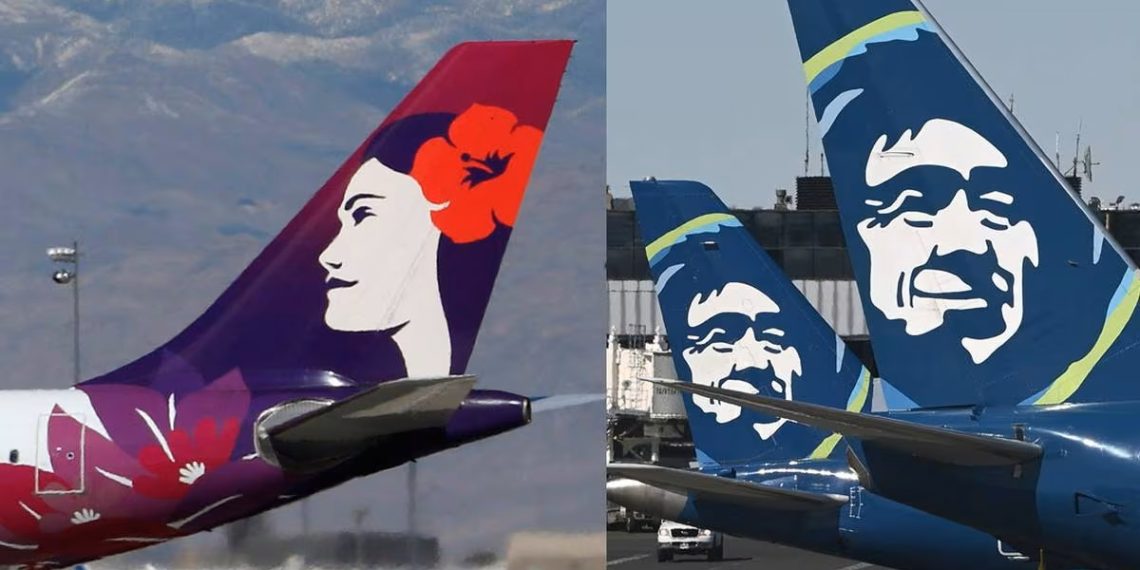The ever-evolving airline industry is once again in the spotlight with another proposed buyout, reigniting debates about industry consolidation and its potential impact on consumers. The Biden administration, known for its firm stance against mergers, is set to scrutinize Alaska Air Group’s proposed acquisition of Hawaiian Airlines for a substantial $1 billion in cash.
While this deal is smaller than the major mergers that reshaped the airline industry over a decade ago, it comes at a time when the Justice Department is already challenging another relatively small deal — JetBlue’s proposal to acquire Spirit Airlines.
Alaska Air’s $1.9 Billion Deal to Acquire Hawaiian Airlines
Alaska Airlines’ parent company, Alaska Air Group, announced a significant move to acquire Hawaiian Airlines in a $1.9 billion deal, drawing attention that may attract regulatory scrutiny. The parent company will pay $18 per share for Hawaiian, representing a substantial premium over Hawaiian’s closing stock price on the preceding Friday. Hawaiian Airlines has been grappling with the aftermath of the pandemic and increased competition from Southwest on intra-island flights, reporting a loss of $159 million so far this year.
A noteworthy aspect of this deal is Alaska’s commitment to allow Hawaiian Airlines to continue operating as a stand-alone brand, a move considered unusual in the industry.
Key Details of the Merger
Size of the Deal: Alaska Air Group, headquartered in Seattle, values the deal at $1.9 billion, encompassing the assumption of Hawaiian’s significant net debt of $900 million. Together, the merged airlines would boast a fleet of 365 planes and serve 138 destinations, including 29 outside the United States.
Market Reaction: The announcement prompted a substantial market reaction. Shares of Hawaiian Holdings Inc. nearly tripled, closing at $14.22, while Alaska witnessed a 14% drop, closing at $34.08.
About Alaska and Hawaiian: While Alaska Air Group ranks as the fifth-largest U.S. airline by 2022 revenue, with its primary operations on the West Coast, Hawaiian Airlines, with a revenue one-fourth that of Alaska, operates flights throughout the island chain and to the U.S. mainland. Hawaiian Airlines relies heavily on traffic between Asia and Hawaii, with its only East Coast destinations being New York and Boston.
Reputations: Both Alaska and Hawaiian are considered traditional airlines, with fare structures typically in line with larger carriers. Despite facing consumer complaints in the middle range, they are known for their commendable on-time flight performances.
Frequent-Flyer Programs: Alaska asserts that the two airlines will operate separately but under a unified loyalty program. The specifics of how this will impact benefits and loyalty programs remain unclear.
Regulatory Scrutiny: The proposed acquisition is expected to face regulatory scrutiny, aligning with the Biden administration’s commitment to preserving competition. The Justice Department’s recent opposition to certain airline partnerships adds complexity to the regulatory landscape.
Pro and Con Arguments: Potential concerns may arise about the consolidation of traffic between Hawaii and the U.S. mainland, with critics arguing against potential market dominance. Alaska’s CEO sees the acquisition as a strategic move to compete against major U.S. airlines.
Previous Airline Mergers: The federal government historically raised few objections to mergers, contributing to the dominance of a few major carriers. However, the Biden administration seems more vigilant about the potential consequences of such mergers on competition and consumer welfare.
Impact on Travelers: The aftermath of airline mergers has seen fluctuations in airfares, with average fares decreasing but fees growing sharply, partly offsetting lower fares. Industry proponents insist that competition in the airline sector remains robust.
As the industry potentially undergoes a transformative phase, the Alaska Airlines and Hawaiian Airlines merger raises questions about the intricate dynamics and implications for both the industry and consumers.
Is Alaska Airlines a Partner with Hawaiian Airlines?
The nature of the relationship between Alaska and Hawaiian Airlines is a pertinent question. Will this be a strategic partnership or a more comprehensive merger?
Is Alaska Buying Hawaiian Airlines? Did Hawaiian Airlines Get Bought Out?
The $1 billion cash acquisition prompts queries about the dynamics of the deal. Did Hawaiian Airlines willingly agree to the buyout, or was it a forced acquisition?
As the aviation industry potentially undergoes a transformative phase, these questions underscore the intricacies and implications of the proposed Alaska Airlines and Hawaiian Airlines merger.
Still have some travel questions? Ask in our Travel WhatsApp Group.








